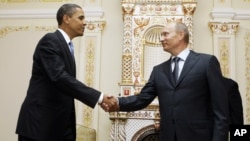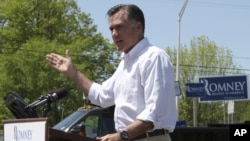Relations between the United States and Russia are in a holding pattern until after the U.S. presidential elections in November, according to experts on diplomacy between the two nations.
According to this analysis, once the new American president is chosen and Vladimir Putin settles in as the new Russian president, U.S./Russia relations should resume a level of cooperation established in recent years.
Putin was sworn in as president this month, succeeding Dmitri Medvedev, who is now the new prime minister. In the United States, President Barack Obama is running for a second term against the presumptive Republican nominee, Mitt Romney.
Given the political situation in both countries, the diplomatic experts predict few, if any, major developments in their relations until after November.
"But there are shadows in the relationship," says Robert Legvold of Columbia University, "in part because of uncertainties around political developments in the United States.
"And the return of Putin to the presidency," says Legvold, "casts a further shadow, because his image in the West and in the U.S. and the media is negative."
During the Russian presidential campaign, Putin used a lot of anti-American rhetoric, a tactic that worked for him in the past.
But Legvold says such discourse has negative consequences because "it reinforces the impression that the Russians are anti-American, or that Putin is anti-American, or not ready to behave constructively. If it is primarily for electoral purposes, it's very short-sighted."
Stephen Cohen, professor emeritus at Princeton University and New York University, points to anti-Russian rhetoric in the American presidential campaign.
"When Romney says Russia is now America's 'number one geopolitical enemy' - which is so far from the empirical truth it's hard to even comment on it," says Cohen, "it's heard in Moscow.
"It's heard as a serious statement," Cohen adds. "It means only bad will come from the Americans; that they won't be partners; they won't honor their agreements; they won't make concessions."
Cohen says such statements are not constructive because "as Putin comes back to power because he wonders, 'yes, Romney said it and he's not the president. But is that the president's own view?'"
Analysts say with such statements, hardliners on the U.S. side inevitably reinforce the hardliners in Russia and vice-versa.
President Obama has made better relations with Moscow a cornerstone of his foreign policy. His so-called "reset" in relations with then-Russian President Medvedev and then-Prime Minister Putin, brought about a major arms control agreement and increased cooperation on such issues as Afghanistan and Iran.
But despite the harsh statements from Putin during Russia's presidential campaign, Colombia's Legvold says the Obama administration expects continuity in Moscow's foreign policy "because they believe that almost everything that they endorsed during the Medvedev period was blessed by Putin.
"They were persuaded that Medvedev was not acting alone, let alone in opposition to Putin, anywhere along the line," Legvold said.
Legvold believes that whether it was the signing of the New START arms control treaty, or opening new transit routes in Afghanistan, or Moscow's evolving policy on Iran, "all of those initiatives, notwithstanding some of the rockiness around Libya or Syria and the like, the assumption was that Putin was on board."
Analysts say one thing is for sure: the U.S.-Russia relationship has grown over the years to such an extent that they say a return to the tension-filled Cold War days is virtually impossible.
According to this analysis, once the new American president is chosen and Vladimir Putin settles in as the new Russian president, U.S./Russia relations should resume a level of cooperation established in recent years.
Putin was sworn in as president this month, succeeding Dmitri Medvedev, who is now the new prime minister. In the United States, President Barack Obama is running for a second term against the presumptive Republican nominee, Mitt Romney.
Given the political situation in both countries, the diplomatic experts predict few, if any, major developments in their relations until after November.
"But there are shadows in the relationship," says Robert Legvold of Columbia University, "in part because of uncertainties around political developments in the United States.
"And the return of Putin to the presidency," says Legvold, "casts a further shadow, because his image in the West and in the U.S. and the media is negative."
During the Russian presidential campaign, Putin used a lot of anti-American rhetoric, a tactic that worked for him in the past.
But Legvold says such discourse has negative consequences because "it reinforces the impression that the Russians are anti-American, or that Putin is anti-American, or not ready to behave constructively. If it is primarily for electoral purposes, it's very short-sighted."
Stephen Cohen, professor emeritus at Princeton University and New York University, points to anti-Russian rhetoric in the American presidential campaign.
"When Romney says Russia is now America's 'number one geopolitical enemy' - which is so far from the empirical truth it's hard to even comment on it," says Cohen, "it's heard in Moscow.
"It's heard as a serious statement," Cohen adds. "It means only bad will come from the Americans; that they won't be partners; they won't honor their agreements; they won't make concessions."
Cohen says such statements are not constructive because "as Putin comes back to power because he wonders, 'yes, Romney said it and he's not the president. But is that the president's own view?'"
Analysts say with such statements, hardliners on the U.S. side inevitably reinforce the hardliners in Russia and vice-versa.
President Obama has made better relations with Moscow a cornerstone of his foreign policy. His so-called "reset" in relations with then-Russian President Medvedev and then-Prime Minister Putin, brought about a major arms control agreement and increased cooperation on such issues as Afghanistan and Iran.
But despite the harsh statements from Putin during Russia's presidential campaign, Colombia's Legvold says the Obama administration expects continuity in Moscow's foreign policy "because they believe that almost everything that they endorsed during the Medvedev period was blessed by Putin.
"They were persuaded that Medvedev was not acting alone, let alone in opposition to Putin, anywhere along the line," Legvold said.
Legvold believes that whether it was the signing of the New START arms control treaty, or opening new transit routes in Afghanistan, or Moscow's evolving policy on Iran, "all of those initiatives, notwithstanding some of the rockiness around Libya or Syria and the like, the assumption was that Putin was on board."
Analysts say one thing is for sure: the U.S.-Russia relationship has grown over the years to such an extent that they say a return to the tension-filled Cold War days is virtually impossible.








